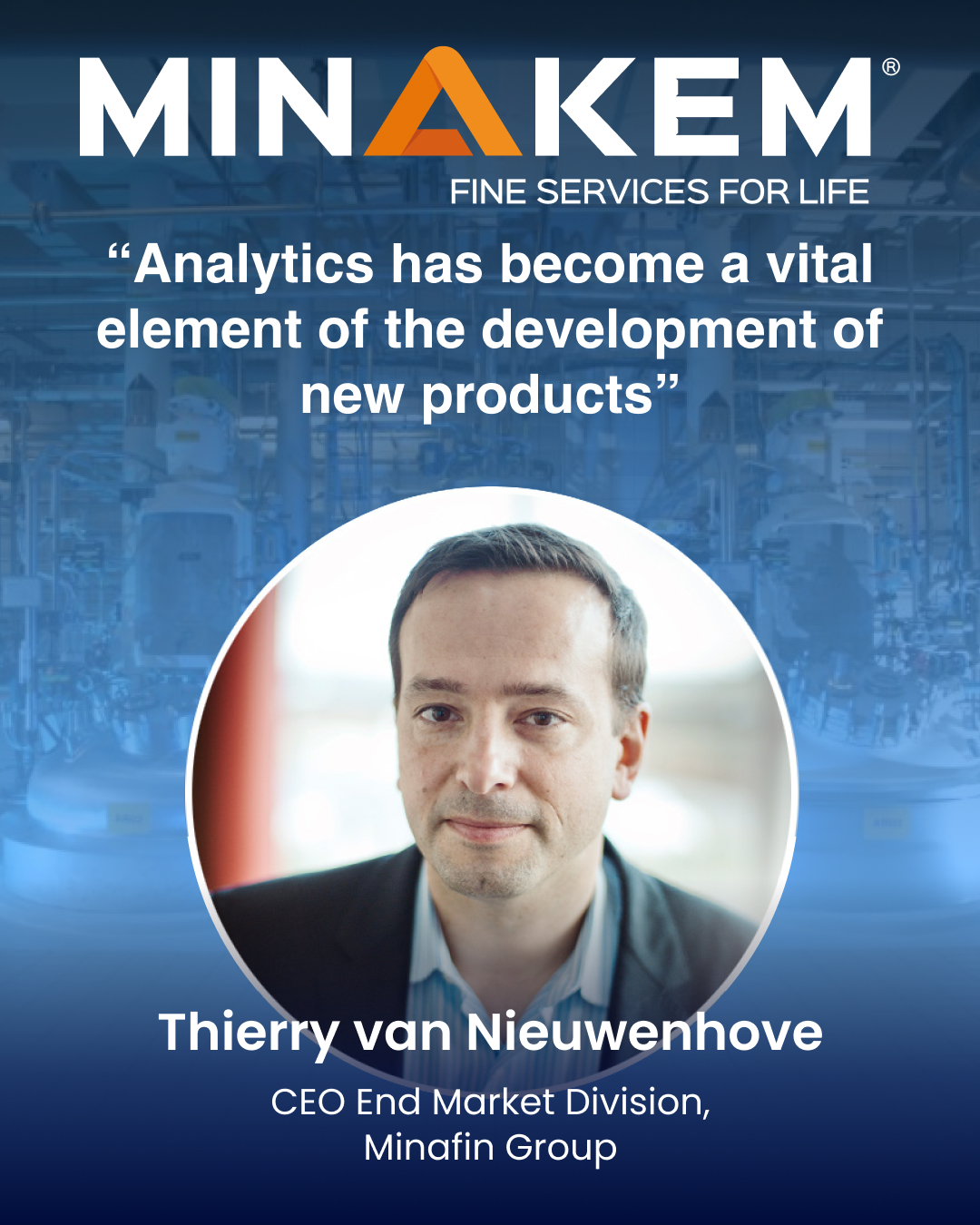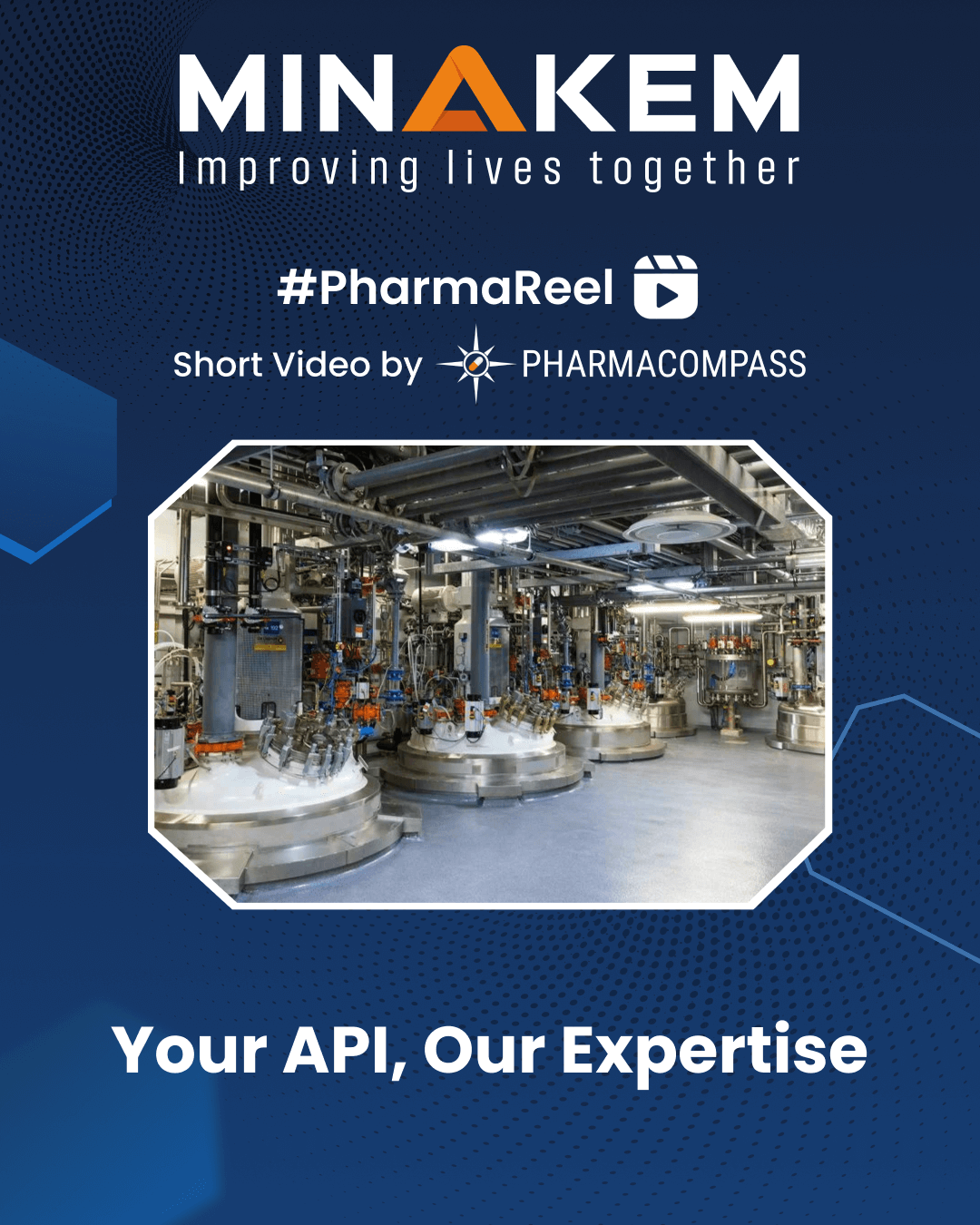
#Interview with Chemistry Today
2020-05-28
Impressions: 788
Thierry van Nieuwenhove, CEO of the End Market Division at Minafin Group, discusses the challenges faced by the company and the changes performed to meet them. He talks about possible investments in the near future, technologies supporting Minakem’s development, patient-centric strategies, and the importance of analytical management in the pharmaceutical development and manufacturing value chain.
Mr Van Nieuwenhove, you joined minafin group as CEO of the End Market Division three years ago. What new challenges did you bring to the group, and what are the changes performed to meet them?
In only three years we have worked as a team to :
- Develop Minakem as a recognized brand on the CMO market; Minakem has a lot of services and technologies ( some very unique) that can help our customers to be fast and efficient to the market. We ensured the service a Customer receives from any of our sites remains identical and in line with the expected standard.
- Ensure our existing and future customers are placed in the center of our focus. Whatever your position in the company, one must remember that the customer should be in the center of our attention. Eventually, we must all acknowledge that a Customer- centric organization in our industry means that we pay attention to the patient that will ultimately be at the end of the chain! As such words like quality, efficiency, the security of supply, mean a lot to us.
- Roll out OE (Operational Excellence) to the entire organization. The focus was to ensure that we continuously improve ourselves, we deliver and improve efficiency and involve all our teams in this success. It is a long term journey, but which today has already given successes in our daily life.
The pharma business unit represents 70 percent of the group’s revenues, but the cosmetic and agri-food businesses are undoubtedly essential niches markets as well. Are you planning to invest in these businesses in the near future?
Yes, in three years, we have transformed Minasolve (Cosmetics) from a mono-product business to a full catalog company. Minasolve, under the “Green Solving Attitude” spirit, is now able to offer the Cosmetic Industry a fully integrated green alternative to cosmetics ingredients and preservatives. The “sustainable beauty” represents, within Minasolve, a definite meaning of giving every customer a green option for their products, with a service on top!. We have recently launched Minagro. Minagro is the green solving option for the agro-industry. Our focus is to ensure that sustainable agro-industry also means using eco-friendly products that ultimately will be used in our fields.
Concerning the pharma business division (minakem), are there any new technologies that have supported its development?
There are technologies, e.g., flow chemistry, enzyme-catalysis, or RC1 profiling, that simply improve the process economy or safety aspects of pharma manufacturing. Minakem is undoubtedly looking into those and has already taken steps towards implementing such technologies on a routine basis. When it comes to new, enabling technologies, it is crucial not only to analyze the development pipelines of our customers in the pharmaceutical industry but also to analyze what new therapeutic concepts are currently are under investigation. The trends in innovative medicine also pretty much determine what technologies a CMO needs to apply to address those needs. Here, we can see a good part of the early-stage pharmaceutical pipelines changing to what we call “new modalities,” chemical APIs that look more structurally complex or different, in nature, versus their predecessors. There are new, semi-synthetic conjugates, hybrid-molecules, complex heterocycles or multifunctional molecules that are engineered to hijack cellular processes, such as translational regulation or degradation mechanisms. The challenge for a company like Minakem, who is in the small molecule business, is, how can those trends be translated into chemical solutions, and what tool-box do we need to make it happen? For a good part, maybe even for the majority, we do not need a completely different technical set-up. We just need a highly flexible and easy adjustable manufacturing configuration that can handle even more highly diverse chemical processes in parallel, not just high volume blockbuster drugs: new catalytic systems that can also be run in continuous flow and at deep temperatures; a semi-synthetic process involving enzymes an aqueous-organic media; sophisticated monitoring devices that allow us to process sensitive coupling reactions, especially in conjugations smoothly–just to name a few. Minakem is continuously learning how to upgrade its technological basis and how to attract the right talents who can help us to move to the next level of innovation.
Pharma business has become patient-centric, and the tagline of the company “chemistry for life” summarises perfectly the core mission of minakem. How can a company (cdmo) like minakem contribute to better human health? How can the safety of the supply chain be improved? How can quality be assured? How can time to market be accelerated without an increase in costs?
Companies like Minakem, who are providing custom manufacturing services to the pharmaceutical industry, are essential for patients’ needs and the entire society. Everybody points to pharma when it comes to curing diseases and adequately supplying drugs and medical devices. Yet behind the big pharma brands is a complex universe of suppliers, distributors, academic institutions, think tanks, and technology providers. Facing the current Coronavirus sanitary crisis, the biggest reality check is how vulnerable our supply chains are, and how critical it is to protect them. To re-design and diversify them might be an essential consequence after we have overcome this crisis. And this is were companies like Minakem play a key role. The final pill package is just the tip of the iceberg. We all depend heavily on every step of the way from the original idea in the lab to the final pill going smoothly. Having the right partners with companies like Minakem within this complex and interdependent supply chain is not only essential – it saves lives. Our customers in the pharmaceutical industry rely on the collective wisdom, capacity and commitment of everybody involved in making the transition from the bench to the patients’ bedsides happen.
Furthermore, our responsibility doesn’t just stop at providing products and services to our customers under the highest quality standards, where we get routinely audited and certified, we also need to make sure medicine becomes affordable for all patients in need. Here, we do not only optimize our existing supply chains and production facilities to assure smooth and cost-efficient processes, this is also where science and technology comes in. To find the best synthetic pathway to a chemical API using novel technologies in order to reduce cumbersome multi-step processes and to eliminate waste is always in our focus to stay lean and cost-effective, which ultimately translates into affordable prices for medical treatments. For instance, there are examples where the manufacturing cost of an API could be cut in half by employing a specifically designed catalyst system to eliminate costly protection/deprotection steps in chemical processing. It is also the reason why we closely monitor our customer’s product pipelines so we can prepare ourselves for lean manufacturing of their products by employing innovative technical solutions.
What are, according to you, the issues impacting the pharmaceutical development and manufacturing value chain? How are you going to face them?
ANALYTICS. Today all pharma companies are looking at speed to market and first-time-right quality whether we speak about new or existing products.
Analytics has become a vital element of the development of new products, and authorities are getting more and more focus on the quality of the product as impurities are being tracked at levels that were never thought about less than five years ago. Realizing today that Analytical Management is as crucial as operation, R&D,… is a gap that all companies have not yet been able to make and certainly to implement.
We have taken that path for three years!
A word with Thierry van Nieuwenhove – CEO End Market – Minafin Group





